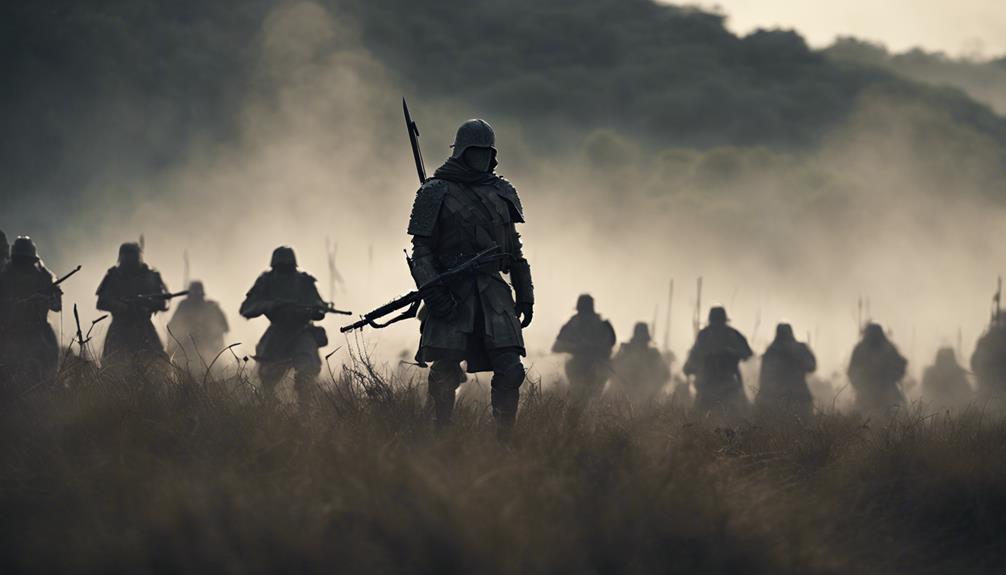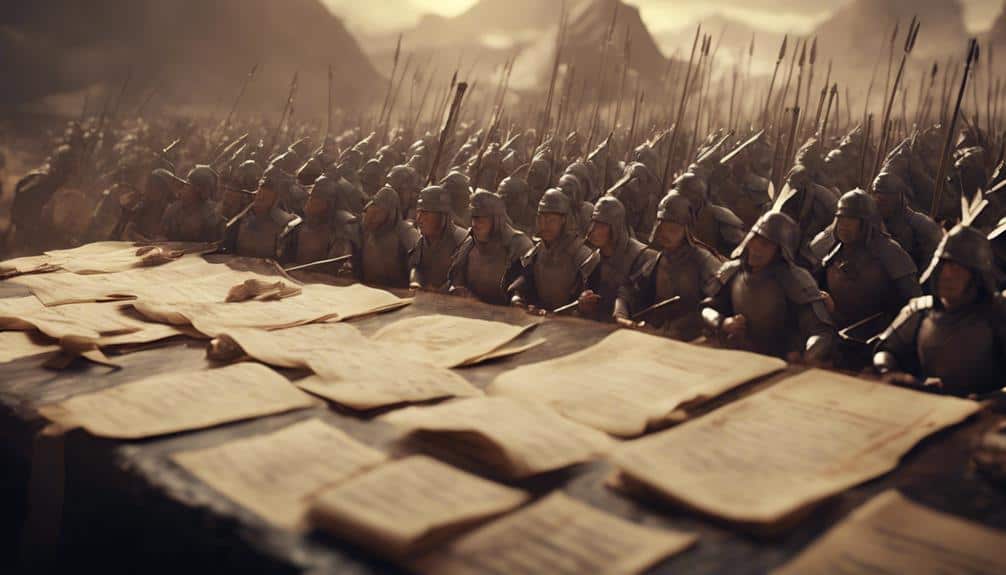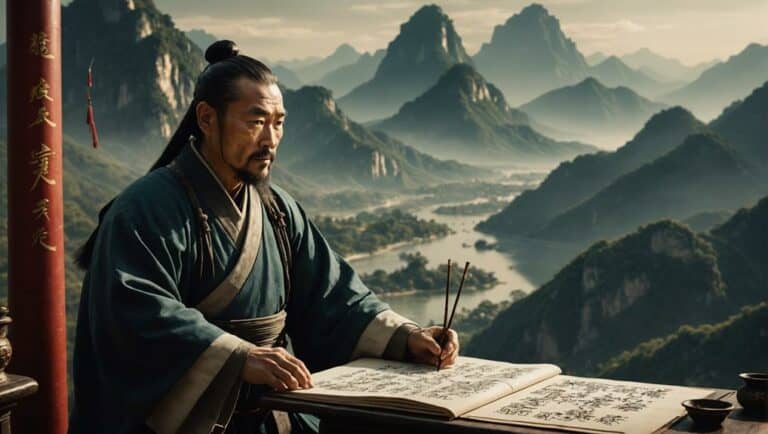Unlock the timeless wisdom of Sun Tzu's 'The Art of War,' where strategic mastery is achieved through understanding both oneself and the adversary, leveraging deception, and efficient resource management.
Discover how meticulous planning, adaptable tactics, and insightful intelligence can lead to unparalleled success in any endeavor.
Strategic Foundations

At the core of Sun Tzu's 'The Art of War' lies the principle that understanding both oneself and the enemy is essential for crafting effective and adaptable strategic foundations. You'll recognize the importance of strategic thinking in the text, which emphasizes that a thorough comprehension of your strengths, weaknesses, and the intricacies of your adversary is crucial.
This dual understanding forms the bedrock of preparation and strategic planning, enabling you to anticipate challenges and leverage opportunities effectively.
Sun Tzu advocates for continuous self-assessment and enemy analysis as fundamental steps in your strategic process. By understanding one's capabilities and the opponent's potential actions, you can devise strategies that are both flexible and responsive to changing scenarios. This adaptability is key, as rigid plans often falter in the face of dynamic situations.
Moreover, Sun Tzu's teachings highlight the necessity of deception and unpredictability. By keeping your enemy uncertain, you maintain a strategic advantage. Therefore, meticulous preparation and strategic foresight become paramount in creating a robust strategy.
Essentially, the fusion of self-awareness and enemy insight ensures a balanced, proactive approach to strategy, allowing you to navigate complexities with precision and confidence.
Economic Warfare

In 'The Art of War,' Sun Tzu emphasizes the importance of efficient resource allocation, highlighting that a well-managed economy can be a decisive factor in conflicts.
You'll find that economic strength and strategic supply chain management are pivotal for sustaining military operations and gaining an advantage.
Efficient Resource Allocation
Efficient resource allocation, a cornerstone of Sun Tzu's 'The Art of War,' underscores the necessity of maximizing economic potential and managing resources meticulously to gain a strategic advantage. Sun Tzu emphasizes that strategic planning in resource allocation can provide a significant competitive edge in both military and modern contexts. By understanding your economic potential and effectively managing resources, you guarantee that every asset is utilized to its fullest capacity.
Sun Tzu's teachings highlight the importance of supply chain management in conflicts. Proper resource allocation involves not just the accumulation of resources but their best deployment. This means knowing when and where to allocate resources to avoid waste and ensure sustainability. Efficient resource management can tip the scales in your favor, allowing you to outmaneuver opponents by maintaining stronger, more sustained operations.
In practical terms, this involves meticulous planning and foresight. You need to anticipate needs and potential shortages, allocate resources judiciously, and adapt to changing circumstances. By adhering to Sun Tzu's principles, you can transform resource management into a powerful strategic tool, guaranteeing that your efforts yield maximum results with minimal waste. This approach is integral to gaining a competitive edge in any strategic endeavor.
Economic Strength Utilization
Harnessing economic strength is pivotal in Sun Tzu's 'The Art of War,' as it underscores the essential role of leveraging financial resources to gain a strategic upper hand. Sun Tzu's timeless wisdom illustrates that economic strength isn't just about wealth; it's about how effectively you allocate and utilize those resources. By managing your economic assets wisely, you can sustain prolonged efforts, outlast adversaries, and create opportunities for decisive action.
Understanding economic strength involves a meticulous approach to resource allocation. You must identify critical areas where financial input can generate the highest strategic returns. This could mean investing in technology, training, or supply reserves that secure your forces are better equipped and more resilient than your opponents. Sun Tzu emphasizes that strategic advantage often comes from the unseen—having the financial cushion to weather disruptions or implement sudden, impactful moves can be a game-changer.
In modern terms, Sun Tzu's principles of economic warfare remain relevant. Whether in business or military contexts, the careful management of economic resources guarantees you're always a step ahead. It's about making every dollar count towards your overarching strategic goals, thereby turning economic strength into a formidable weapon.
Supply Chain Management
Sun Tzu's 'The Art of War' highlights the utmost importance of supply chain management in ensuring sustained operational success and strategic superiority. He emphasizes that efficient resource management is vital in economic warfare strategies. By carefully managing supply chains, you can guarantee that resources are available when and where they're needed, minimizing the risk of shortages and inefficiencies.
To harness your economic potential, you must first understand the capabilities and limitations of your resources. Sun Tzu teaches that wise allocation and utilization of resources can provide a significant strategic advantage. In modern terms, this translates to optimizing supply chains to reduce costs and improve response times, thereby outmaneuvering competitors in the marketplace.
Effective supply chain management involves not just the movement of goods, but also the strategic alignment of all components involved, from procurement to distribution. By adhering to Sun Tzu's principles, you can create a resilient supply chain that can adapt to disruptions and maintain operational continuity.
Ultimately, Sun Tzu's insights on economic warfare are timeless, offering valuable guidance for today's professionals in various fields. His teachings on resource management and economic potential remain pertinent, providing a robust framework for achieving strategic goals.
Deception and Tactics

In Sun Tzu's 'The Art of War,' the effectiveness of deception hinges on surprise attacks and misdirection.
You'll find that executing a surprise attack can catch the enemy off guard, exploiting their unpreparedness for a swift victory.
Misdirection further complicates the enemy's decision-making, leading them into traps and away from your true intentions, thereby securing a strategic edge.
Surprise Attacks Strategy
Mastering the art of surprise attacks, as detailed in Sun Tzu's 'The Art of War,' involves leveraging deception and misdirection to create strategic confusion and exploit enemy vulnerabilities. This strategy in warfare relies on the ability to outthink and outmaneuver your adversary by keeping your intentions hidden.
By employing deception, you gain a competitive edge, making it difficult for the enemy to anticipate your moves. Sun Tzu emphasizes that the key to effective surprise attacks is creating uncertainty in the enemy's mind. When your opponent is unsure of your true intentions, they're more likely to make mistakes and expose their weaknesses.
This is achieved through a series of calculated actions that disguise your real plans and keep the enemy guessing. In practical terms, this might mean feigning weakness to lure the enemy into a trap or spreading disinformation to divert their attention away from your actual target.
Misdirection in Warfare
When you effectively utilize misdirection in warfare, you create opportunities to exploit the enemy's confusion and secure a strategic advantage. Sun Tzu, in 'The Art of War', highlights deception as a fundamental element of successful military tactics. By misleading the enemy, you compel them to make errors, exposing their weaknesses and creating a pathway to victory.
Strategic misdirection involves the deliberate manipulation of the enemy's perceptions. This can be achieved through various means, such as feigned retreats, false intelligence, or simulated attacks. When executed precisely, these tactics can disorient the opponent, leading them to make decisions based on faulty information.
Consider the following key points on employing deception and misdirection:
- Feigned Weakness: Pretend to be vulnerable to lure the enemy into a trap.
- False Information: Disseminate misleading data to confuse enemy plans.
- Diversionary Tactics: Conduct maneuvers that distract the enemy from your true objective.
Leadership Principles

A cornerstone of Sun Tzu's 'The Art of War' is the assertion that strong leadership is pivotal in steering troops towards victory. Sun Tzu's leadership principles emphasize the necessity of inspiring and guiding troops with clarity and determination.
According to the Art of War, a leader must be disciplined and well-trained to make strategic decisions that effectively navigate the complexities of warfare.
You'll notice that Sun Tzu underscores the importance of maintaining high morale and motivation among the troops. This is achieved through consistent and ethical conduct, which reinforces trust and loyalty within the ranks.
A leader who demonstrates moral principles can command respect and foster a cohesive fighting force, essential for overcoming adversaries.
Moreover, Sun Tzu advocates for a leadership style that balances authority with compassion. Effective leaders, per his teachings, must be capable of making tough decisions while also ensuring the well-being of their soldiers.
This dual approach not only enhances operational efficiency but also fortifies the mental and emotional resilience of the troops.
Resource Management

Efficient resource management, as emphasized in Sun Tzu's 'The Art of War,' is paramount for securing both immediate and sustained success in any conflict. Sun Tzu highlights the need for a strategic approach to managing valuable resources, recognizing that the careful allocation and utilization of supplies can determine the outcome of a battle.
Effective resource management involves several key strategies:
- Assessing Economic Potential: Understanding the economic strengths and weaknesses of both your side and the enemy's is vital. This knowledge allows you to plan your moves more effectively.
- Supply Chain Management: Maintaining a robust supply chain ensures that your forces remain well-equipped and capable of sustaining prolonged engagements without faltering.
- Resource Allocation: Prioritizing the deployment of resources where they'll have the most significant impact is essential. This means not wasting valuable supplies on minor skirmishes but reserving them for decisive moments.
Sun Tzu's insights into efficient resource management extend beyond the battlefield, offering valuable lessons for modern strategic planning. By applying these principles, you can enhance your ability to make informed decisions, optimize resource use, and ultimately achieve your objectives with precision and effectiveness.
Understanding and implementing these strategies will strengthen your position in any competitive endeavor.
Intelligence and Espionage

Understanding the vital role of intelligence and espionage, Sun Tzu's 'The Art of War' underscores that thorough knowledge of the enemy's plans and movements can decisively tilt the balance in your favor.
Intelligence gathering isn't merely a supplementary aspect of warfare; it's a cornerstone of strategic advantage. Sun Tzu advocates for the use of espionage to gain essential insights into the enemy's intentions and capabilities. This intelligence allows you to anticipate and counteract enemy moves effectively.
By employing spies and conducting reconnaissance, you gather indispensable information that shapes your strategic planning. Espionage enables you to uncover the enemy's strengths and vulnerabilities, guiding your decisions and actions towards best outcomes. Sun Tzu emphasizes that informed decision-making, based on accurate intelligence, often determines the success or failure of military campaigns.
Effective use of intelligence gathering not only provides a clearer picture of the battlefield but also helps in crafting strategies that exploit the enemy's weaknesses. This strategic advantage is vital in both offensive and defensive operations.
Essentially, Sun Tzu's treatise highlights that the foresight granted by espionage and intelligence is a crucial element in mastering the art of war.


